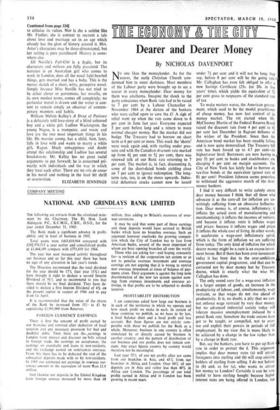FOREIGN CURRENCY EARNINGS
There is first the amount of profit earned by our branches and remitted after deduction of local taxation and any necessary provision for bad and doubtful debts. Then there are the ,earnings in London from interest and discount on--!bills related to foreign trade, the earnings on acceptances, the earnings on overdrafts and loans to non-residents, and the exchange earned on remittances overseas. From this there has to be deducted the cost of the substantial deposits made with us by non-residents. In 1965 our estimated net earnings in overseas cur- rencies amount to the equivalent of more than £1.8 million.
And likewise our deposits in the United Kingdom from foreign sources increased by more than £8
million, thus adding to Britain's resources of over- seas currencies.
It may be said that some part of those earnings and these deposits would have accrued to British banks which have no branches overseas. Such an argument however overlooks the growing competi- tion which the City of London has to face from American banks, several of the most important of whom are busy opening branches all over the world.
Those who are asking for—and hoping constantly for—a revision of the corporation tax system so as not to penalise overseas investment and overseas earnings are not arguing that it is wrong to restrict new overseas investment at times of balance of pay- ments crises. Their argument is against the long term discrimination of the new tax system against earn- ings from overseas investments and overseas ac- tivities, in that profits are to be subjected to double taxation.


































 Previous page
Previous page